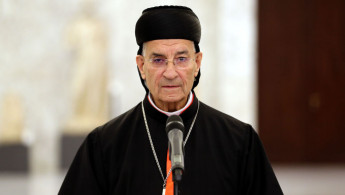Lebanese cleric: High-level 'agreement' limits judge's power in port investigation
A high-ranking Christian cleric announced on Tuesday night that Lebanon's leadership had made an agreement that could limit the authority of a judge handling the Beirut port explosion investigation.
The deal, announced by Maronite Patriarch Bechara Boutros Al-Rai in a press conference, would refer former ministers to a special council run by parliament.
Judge Tarek Bitar, who has been leading the probe into the 4 August 2020 blast which killed at least 219 people and wounded 6,500, would be limited to summoning and questioning low-ranking officials.
The agreement announced by Al-Rai has not been confirmed by any government officials and it is unclear if it will be put into force.
Al-Rai's announcement was preceded by his own shuttle diplomacy between the Lebanese prime minister, president, and speaker of the house to try to find a solution to the escalating conflict over the blast probe.
In recent months, Shia parties and militias Hezbollah and Amal have stepped up their campaign against Bitar, accusing him of political bias and working for foreign agencies. Their protests come as Bitar has issued repeated summons for high-ranking officials, such as security chief Abbas Ibrahim.
Both parties have pulled their representatives from cabinet meetings in protest of Bitar's probe. The cabinet has not met since 12 October as a result.
The deal announced by Al-Rai would send former ministers to the Supreme Council, a judicial body meant to try presidents and ministers. It has never convened nor charged anyone since its conception.
Legal experts also say that the Supreme Council is designed to prosecute individuals for treason and a failure to perform their duties. However, the Beirut port investigation involves criminal charges such as homicide, rather than political crimes which the Council is designed to try.
In July, more than 50 MPs attempted to pass a motion which would transfer the probe to the Council. The move provoked a sharp backlash from civil society and the general public, and several MPs announced that they were withdrawing their signatures.
On Wednesday, former Prime Minister Hassan Diab filed a lawsuit against the Lebanese government over "grave mistakes" made by Bitar in his handling of the probe. Bitar has called Diab for questioning for a third time, after he did not show for the first two summons.
Diab is charged with negligence for his role in the Beirut port explosion. The suit will allow him to delay questioning by Bitar, which was scheduled for the next day.
On the same day, another victim of the port blast passed away. Abbas Mazloum succumbed to his wombs 15 months after the blast, leaving behind five children.





 Follow the Middle East's top stories in English at The New Arab on Google News
Follow the Middle East's top stories in English at The New Arab on Google News
![Netanyahu furiously denounced the ICC [Getty]](/sites/default/files/styles/image_330x185/public/2024-11/GettyImages-2169352575.jpg?h=199d8c1f&itok=-vRiruf5)
![Both Hamas and the Palestinian Authority welcomed the ICC arrest warrants [Getty]](/sites/default/files/styles/image_330x185/public/2024-11/GettyImages-2178351173.jpg?h=199d8c1f&itok=TV858iVg)
